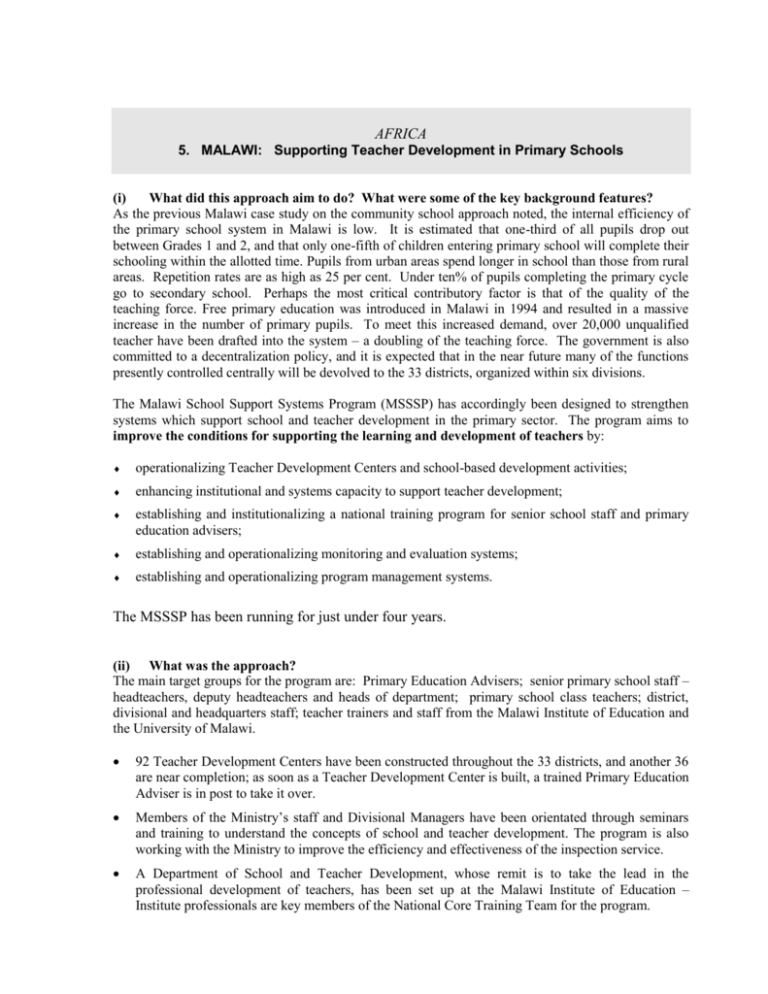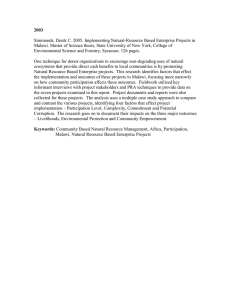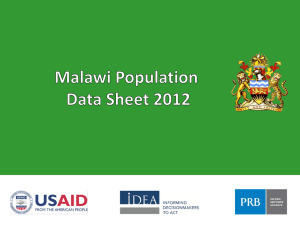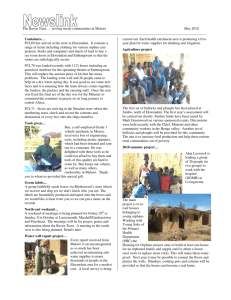MALAWI: Supporting Teacher Development in Primary
advertisement

AFRICA 5. MALAWI: Supporting Teacher Development in Primary Schools (i) What did this approach aim to do? What were some of the key background features? As the previous Malawi case study on the community school approach noted, the internal efficiency of the primary school system in Malawi is low. It is estimated that one-third of all pupils drop out between Grades 1 and 2, and that only one-fifth of children entering primary school will complete their schooling within the allotted time. Pupils from urban areas spend longer in school than those from rural areas. Repetition rates are as high as 25 per cent. Under ten% of pupils completing the primary cycle go to secondary school. Perhaps the most critical contributory factor is that of the quality of the teaching force. Free primary education was introduced in Malawi in 1994 and resulted in a massive increase in the number of primary pupils. To meet this increased demand, over 20,000 unqualified teacher have been drafted into the system – a doubling of the teaching force. The government is also committed to a decentralization policy, and it is expected that in the near future many of the functions presently controlled centrally will be devolved to the 33 districts, organized within six divisions. The Malawi School Support Systems Program (MSSSP) has accordingly been designed to strengthen systems which support school and teacher development in the primary sector. The program aims to improve the conditions for supporting the learning and development of teachers by: operationalizing Teacher Development Centers and school-based development activities; enhancing institutional and systems capacity to support teacher development; establishing and institutionalizing a national training program for senior school staff and primary education advisers; establishing and operationalizing monitoring and evaluation systems; establishing and operationalizing program management systems. The MSSSP has been running for just under four years. (ii) What was the approach? The main target groups for the program are: Primary Education Advisers; senior primary school staff – headteachers, deputy headteachers and heads of department; primary school class teachers; district, divisional and headquarters staff; teacher trainers and staff from the Malawi Institute of Education and the University of Malawi. 92 Teacher Development Centers have been constructed throughout the 33 districts, and another 36 are near completion; as soon as a Teacher Development Center is built, a trained Primary Education Adviser is in post to take it over. Members of the Ministry’s staff and Divisional Managers have been orientated through seminars and training to understand the concepts of school and teacher development. The program is also working with the Ministry to improve the efficiency and effectiveness of the inspection service. A Department of School and Teacher Development, whose remit is to take the lead in the professional development of teachers, has been set up at the Malawi Institute of Education – Institute professionals are key members of the National Core Training Team for the program. Each Primary Education Adviser and Teacher Development Center has been located in close proximity to the schools which they serve. Along with the Primary Education Adviser, two senior staff from within the zone form a ‘zonal training team’ responsible for implementing the training program for school staff, thus strengthening the capacity of the district to support teacher development activities. At school level, three senior school staff members at each primary school are being trained through a national training program. The program focuses on factors of classroom and school improvement which have been shown significantly to affect student learning. Regular consultation with stakeholders was built into the process of the training program’s development. Four major themes are addressed: staff development and advisory support school organization and management school improvement classroom improvement. Costs: [no information available at this time] (iii) How successful was the approach? How was this success determined? Monitoring and evaluation systems are still in the process of being developed and the first group of trainees have yet to complete their training, so it is premature to talk about ‘impact’. However, a baseline study has been conducted which is providing the basis on which the impact of the program can be monitored and evaluated at school and classroom level, and there are already indications that the program is making a difference, including: MSSSP has worked hard within the education sector to promote the message that the professional development of teachers is important; as of now, the Ministry of Education (MOE) is restoring its Teacher Education Department, to be responsible for all teacher education and development matters. The MOE’s willingness to approve certification and salary enhancement on completion of the training program for Primary Education Advisers and senior school staff marks a practical commitment to teacher development. Evidence suggests that Primary Education Advisers are trying to put into practice what they are learning. Where Teacher Development Centers have been constructed, links with the community have been established, management committees have been formed, and many of these are actively raising funds to support running costs. (iv) On The evidence available, how sustainable/able to go to scale is the approach? Overall, the program is providing the highest level of support to primary education that Malawi has seen but, despite the early successes, there are several constraints on the project, including lack of resourcing, inadequate management structures and high attrition rates caused by HIV/AIDS and its consequences. Reference: Kay, J. (2000) “Supporting teacher development in primary schools (Malawi)” in Saunders, L. (Ed.) School Improvement Worldwide: Nine Case Studies from Six Countries. Manchester: British Council.











